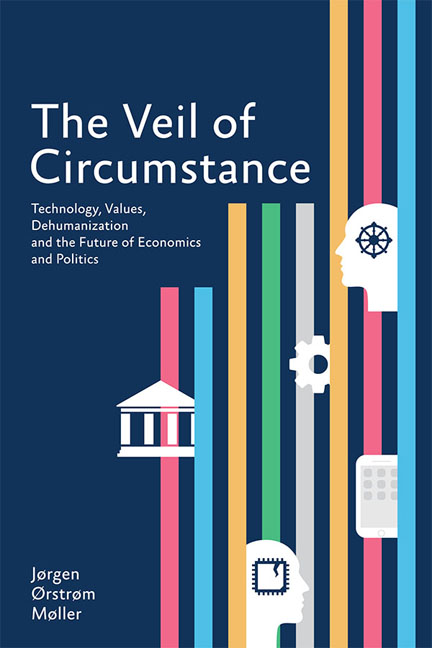 The Veil of Circumstance
The Veil of Circumstance from II - POLITICS
Published online by Cambridge University Press: 19 May 2017
Societies are not free. The benefits of living with others have been recognized since our species first emerged, but those benefits have never been without cost — and in modern society we can calculate costs very precisely and distribute them in different ways. This is the very subject matter of politics. What is needed is a holistic approach summarizing public, private and hidden costs, and the added opportunity costs. Over decades an ongoing debate has tried to compare these costs in a welfare society versus a more free-market economy. In a straight-line comparison of public costs, the free-market economy wins, but including the other elements in a holistic approach makes this result uncertain. A welfare society could better mobilize a society's entire talent mass and costs of enforcement, with less loss of working time. The objective is to forge a smooth running society at the lowest total cost.
Key Concepts
The basic question is what kind of society do the majority of voters want? From there, the society can consider specific sectors — such as education, healthcare and infrastructure — and move on to decide whether public or private ownership is preferable. How the key concepts are tackled depends to a large degree on how equality and fairness is perceived.
A society is, broadly speaking, a network of individuals, organizations/ institutions and businesses kept together through congruent interests, analogous political goals and a sense of fairness. It costs money. The large majority must feel better off inside than outside, after having paid their share of expenditures to finance common activities.
It may well be that some of them would be even better off by moving to another society or community or country, but there are at least two barriers. First, they may be better off economically in a different country, but suffer significant personal and psychological “costs” from living outside the culture they were raised in and understand — their identity, values and group associations. Second, moving costs money as well and brings uncertainty and the risk of a net loss.
The challenge is how to maximize the level of goods and services, minimize the number of people and capital in non-productive sectors, and generate the highest possible social coherence. We want to minimize the number of people who feel socially and culturally outside or sidelined.
To save this book to your Kindle, first ensure [email protected] is added to your Approved Personal Document E-mail List under your Personal Document Settings on the Manage Your Content and Devices page of your Amazon account. Then enter the ‘name’ part of your Kindle email address below. Find out more about saving to your Kindle.
Note you can select to save to either the @free.kindle.com or @kindle.com variations. ‘@free.kindle.com’ emails are free but can only be saved to your device when it is connected to wi-fi. ‘@kindle.com’ emails can be delivered even when you are not connected to wi-fi, but note that service fees apply.
Find out more about the Kindle Personal Document Service.
To save content items to your account, please confirm that you agree to abide by our usage policies. If this is the first time you use this feature, you will be asked to authorise Cambridge Core to connect with your account. Find out more about saving content to Dropbox.
To save content items to your account, please confirm that you agree to abide by our usage policies. If this is the first time you use this feature, you will be asked to authorise Cambridge Core to connect with your account. Find out more about saving content to Google Drive.